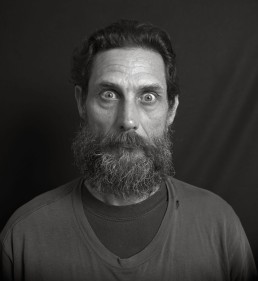S2: Episode 16 - Matthew

Episode Information
[Intro Music]
Narrator: Welcome to Hunger and Resilience, narrative histories about the complexity and experiences of hunger. A traveling exhibition and weekly podcast edited and hosted by Michael Nye, supported by the San Antonio Food Bank, Eric Cooper, executive director. We are grateful for the honesty and eloquence of every voice. Episode 16, Matthew.
Matthew: My mother taught me that if a man would lie, well, he’d cheat you. If he’d cheat you, he’ll steal from you. Well, now he’s a liar, a cheater, and a thief. He’d even kill you to get away with it. She was rough as a lye soap and cow hide. Well, my daddy beat her. He beat her pretty hard. And when she left him, she was, she was tough. And she definitely believed in tough love. Tough love was number one rule in the house. I love you, but I’m fixing to have to whoop you. When my mother died, it, it sent me in a, in a hard spiral, a downward spiral. And, uh, I lost everything. Uh, I was a functioning, dysfunctional. It became a trigger, uh, of anger. Uh, I’d probably been involved in, uh, 50 or more fights between the ages of 15 and 17.
I’ve been cut. I’ve been stabbed. And it doesn’t matter to me how much blood’s coming out of me. I’m gonna get mine. And all I could think about was how much pain this guy needed to feel for, for angering me so much. A dab of pride is good in life. Too much pride. And you can bring yourself down. What I had to learn was that you have a choice. If it’s getting verbal with somebody else, is to turn around and walk off. I’ve done that quite a bit. Only one time I had a guy try to follow me, and I didn’t say nothing, but, uh, I get a look in my eye and I don’t have to say anything.
Well, the homelessness started after my third divorce. And, uh, it just got to a point when child support started, I became apathetic about the whole system. You know, I paid then where are you? You got a car, you gotta keep it fixed, or do you pay rent? I’ve had to go three or four days with nothing to eat until I got paid. That’s humiliating. Right now, I have no finances. I live from day to day. I am, uh, looking for work. I’m trying to get back to driving trucks again. In my belief system, my word is a description of myself, of who I am. It is my dignity. Hunger is, uh, craving. Your nerves go outta whack on you. You get irritable. You start thinking of schemes on how to come up with food. And your mind is taking pictures of banana cream pie and cheesecake and steak, baked potato with the fixings.
It’s almost like a treasure hunt sometimes. I found, um, a lunch Ziploc bag with strawberries that hadn’t been damaged, and they were fresh. I found an energy bar on the ground one time that had been open and hadn’t even been bit off of, didn’t even have ants on it yet. One time I found a six pack of Coors in a ditch. I gave ’em to somebody. I don’t drink Coors. No, I wouldn’t drink Coors. I, I don’t, uh, I have to get behind the tree. ’cause about halfway through the beer I start urinating. It goes through me like water. Desperation to me uh, you just feel like there’s no hand to grab a hold of, no limb or root to hang onto, to keep from falling off a cliff. I I have gone into a grocery store without money and hungry and just walked around.
Sometimes it, it, it’s a fantasizing or a dream of what you’re gonna get the next time you got money in your pocket. It’s, it’s a future type shopping. It’s kinda like window shopping like women do, except your food shopping without no money, it’s all in the frame of mind. If you go in there with a negative attitude and you’re doing that, it’s not good for you. You’re just gonna get depressed. In my mind, I got to eat. My body didn’t get to eat, but my mind got to eat. You can make yourself stretch a little longer, and you have to have humor. To me, humor is just a shortened form of the word humility. Uh, a man without humility is something ain’t right with him. In my mind,
[Outro Music]
Host: These narrative histories are about the experience of hunger close up and about understanding. What is forgotten is lost. These stories are also about not forgetting. What is it like to be that person? Matthew talked about his feeling of desperation, of invisibility, of his loss of gravity. We want to thank Matthew for his openness. We’re grateful for his generous voice and his perspective. May something in his story stay with you. I’m Michael Nye. You can go to my website, michaelnye.org/podcast for photographs and transcripts. Thank you for listening.
